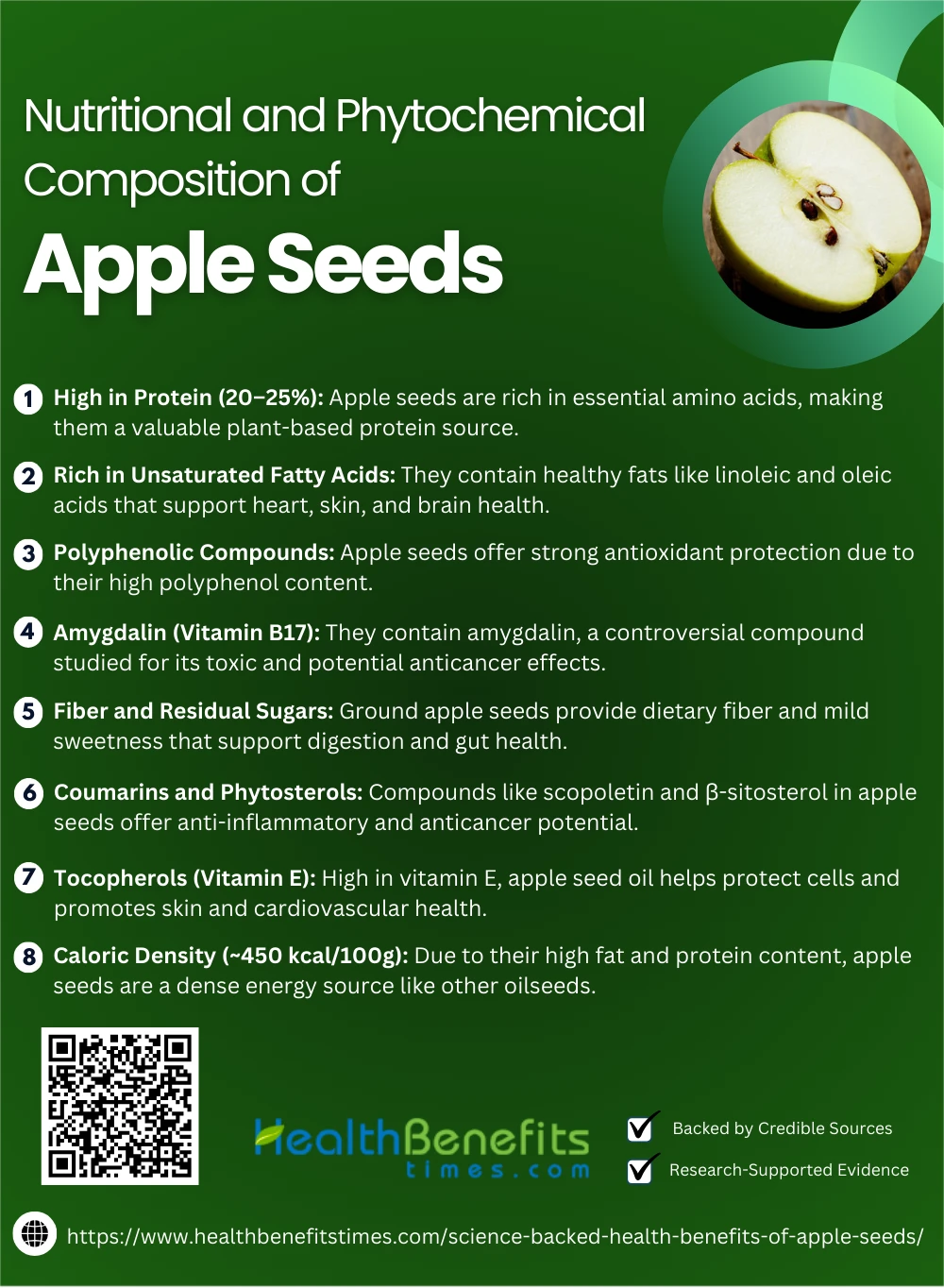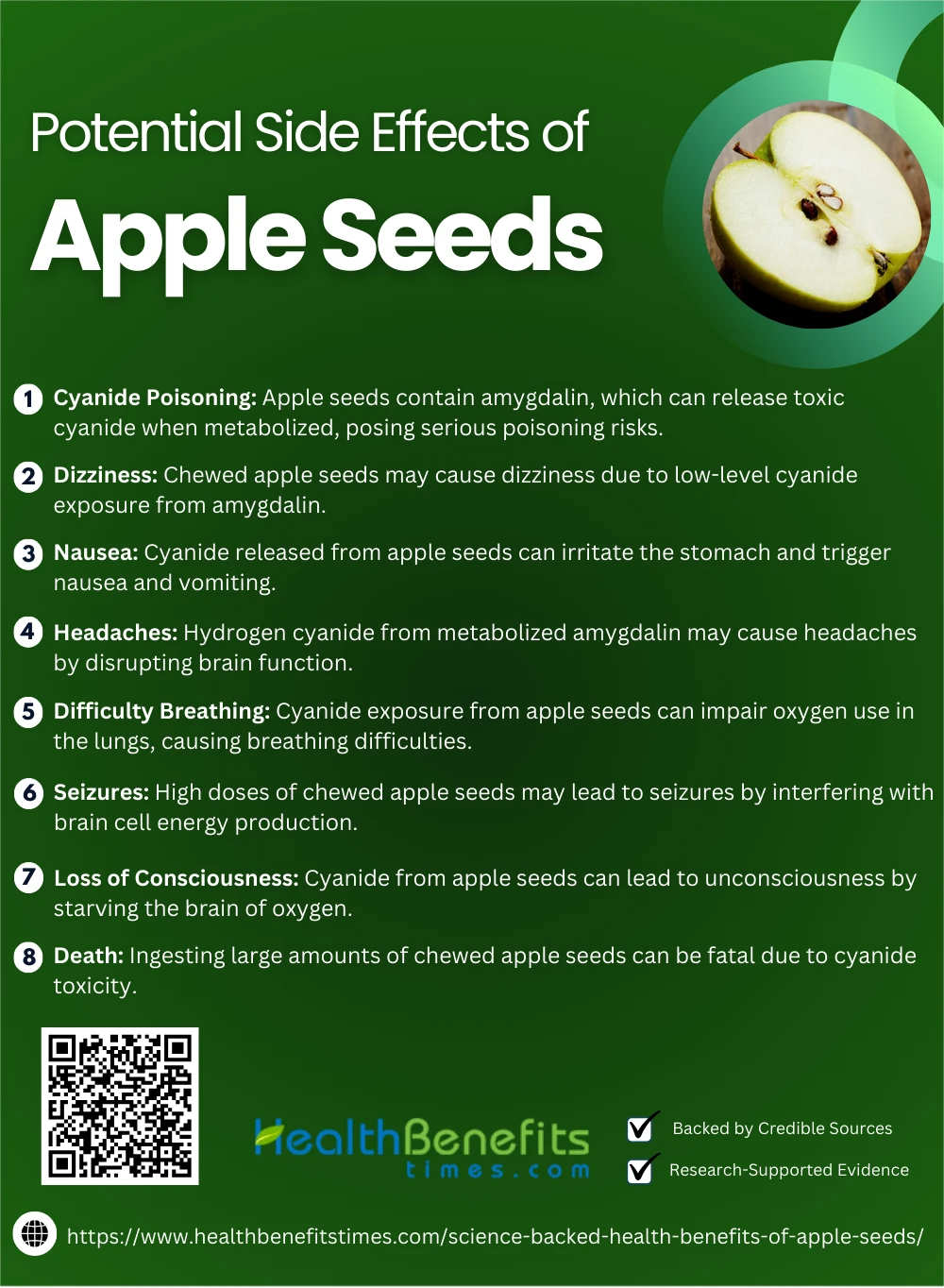- Apple seeds are the small, hard seeds found inside apples, containing bioactive compounds like amygdalin and antioxidants.
- Apple seeds offer potential health benefits such as antioxidant, anti-inflammatory, and heart-protective effects when consumed in moderation.
- Scientific research highlights their phytochemical richness, but cautions against excessive intake due to natural cyanide-producing compounds.
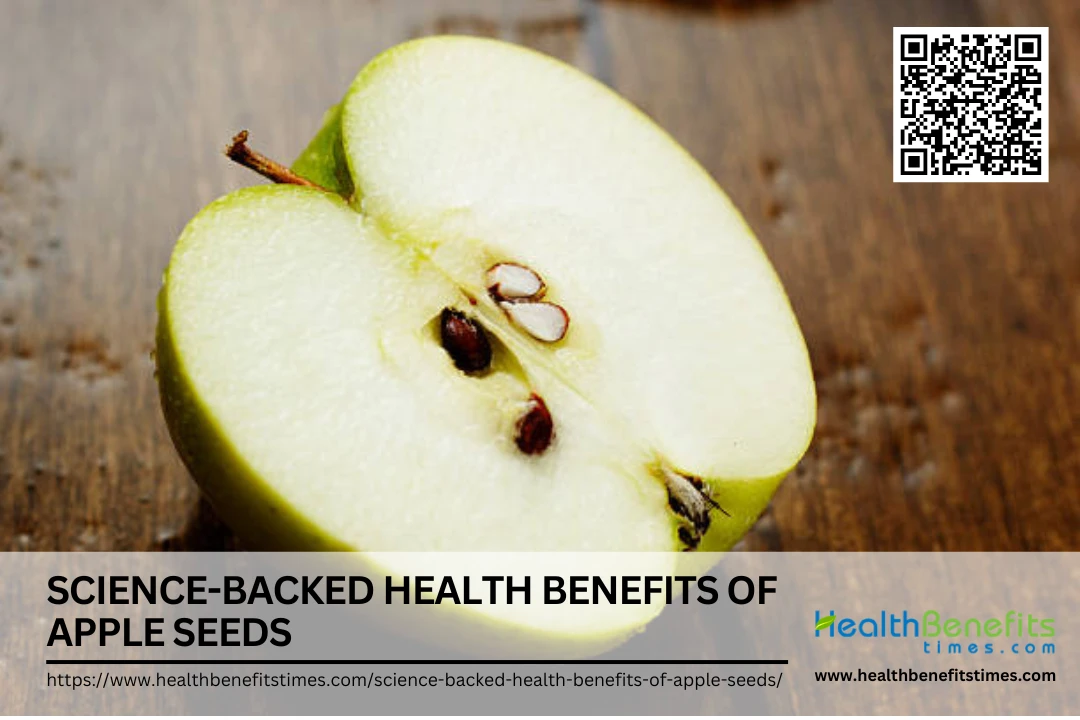 Apple seeds are the small, brown, tear-shaped seeds found at the core of apples (Malus domestica), often discarded despite containing a complex matrix of bioactive compounds and nutrients. Though often overshadowed by concerns about cyanide toxicity, apple seeds have gained increasing attention in the scientific community for their potential medicinal and nutritional benefits. Research has revealed that apple seeds contain polyphenols, flavonoids, proteins, and unsaturated fatty acids that may contribute to antioxidant, anti-inflammatory, and even anticancer activities when consumed in controlled amounts. One study highlights the presence of potent antioxidant agents in apple seed oil, suggesting its possible application in disease prevention and wellness interventions.
Apple seeds are the small, brown, tear-shaped seeds found at the core of apples (Malus domestica), often discarded despite containing a complex matrix of bioactive compounds and nutrients. Though often overshadowed by concerns about cyanide toxicity, apple seeds have gained increasing attention in the scientific community for their potential medicinal and nutritional benefits. Research has revealed that apple seeds contain polyphenols, flavonoids, proteins, and unsaturated fatty acids that may contribute to antioxidant, anti-inflammatory, and even anticancer activities when consumed in controlled amounts. One study highlights the presence of potent antioxidant agents in apple seed oil, suggesting its possible application in disease prevention and wellness interventions.
Nutritional and Phytochemical Composition of Apple Seeds
Apple seeds contain a range of nutrients and bioactive compounds, including healthy fats, proteins, vitamins, and antioxidants, making them a subject of interest in nutritional and phytochemical research.
Apple seeds are notably protein-rich, with studies estimating protein content between 20% to 25% of dry weight. These proteins include essential amino acids such as leucine, valine, and lysine, which are critical for tissue repair, enzyme production, and hormone synthesis. Their potential in plant-based protein formulations and as part of functional food ingredients is increasingly being explored.
2. Rich in Unsaturated Fatty Acids
Apple seed oil contains around 35–38% total fats, with linoleic acid (omega-6) and oleic acid (omega-9) making up the majority. These fatty acids help lower LDL cholesterol and support skin and brain health. Additionally, they improve the oxidative stability of the oil, making it valuable in both food and cosmetics.
3. Polyphenolic Compounds
Apple seeds harbor potent polyphenols such as chlorogenic acid, phloridzin, and quercetin derivatives. These compounds exhibit strong antioxidant properties, neutralizing free radicals that contribute to aging, inflammation, and chronic diseases. The phenolics are more concentrated in seeds compared to the apple pulp.
4. Amygdalin (Vitamin B17)
Amygdalin is a cyanogenic glycoside present in apple seeds at concentrations ranging from 0.6–1.1 mg/g. While small quantities are not harmful, hydrolysis of amygdalin releases hydrogen cyanide—a known toxin. However, amygdalin has also been studied for its controversial anticancer effects (e.g., Laetrile therapy), although not validated for clinical use.
5. Fiber and Residual Sugars
Apple seeds, especially when ground into flour, retain considerable insoluble dietary fiber, beneficial for digestive health. Residual natural sugars and non-starch polysaccharides contribute to mild sweetness and prebiotic potential, supporting gut microbiota.
6. Coumarins and Phytosterols
Compounds like scopoletin (a type of coumarin) and β-sitosterol have been isolated from apple seeds. These molecules are noted for their anti-inflammatory, lipid-lowering, and chemopreventive properties. Studies have shown inhibitory effects on microbial growth and proliferation of cancer cells in vitro.
7. Tocopherols (Vitamin E)
Tocopherols, especially α-tocopherol, are abundant in apple seed oil. They enhance antioxidant stability, protect cellular membranes from oxidative damage, and contribute to skin and cardiovascular health. This makes apple seed oil suitable for dermatological products.
8. Caloric Density (~450 kcal/100g)
Apple seeds are calorie-dense due to their oil and protein content. This makes them a compact energy source, comparable to sunflower or flax seeds. Their energy value suggests a role in survival diets or high-energy formulations.
Science-Backed Health Benefits of Apple Seeds
Apple seeds, though often discarded, may offer several health benefits when consumed safely. Scientific studies suggest they possess antioxidant, anti-inflammatory, and potentially anticancer properties due to their unique compounds.
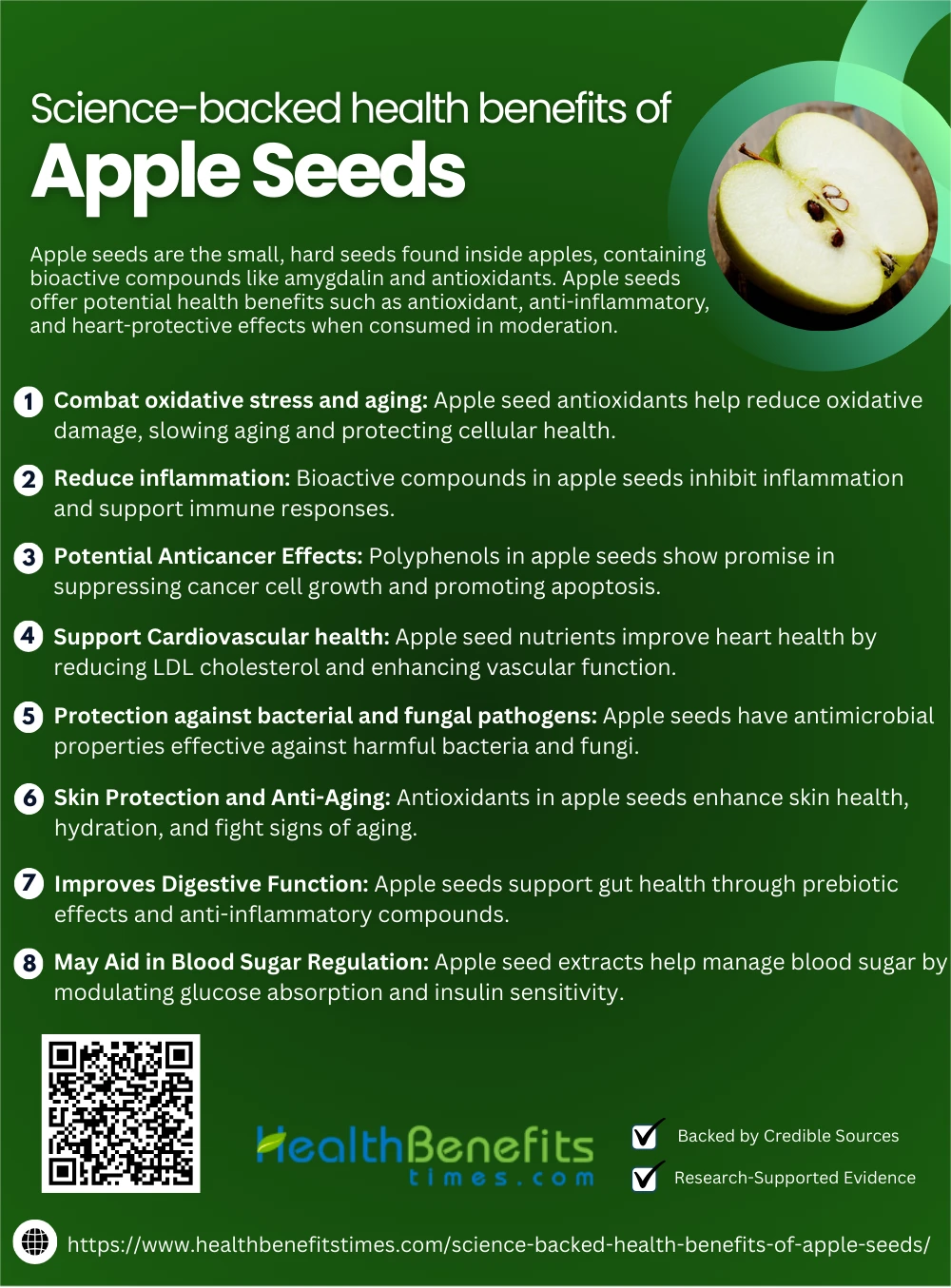 1. Combat oxidative stress and aging
1. Combat oxidative stress and aging
Apple seeds are rich in polyphenols and antioxidants like phloridzin, which combat oxidative stress and cellular aging. These compounds neutralize free radicals, reducing damage to cellular structures and DNA, which are primary drivers of aging processes. A study showed that phytochemicals in apple seeds enhance antioxidant defenses. (1) Moreover, apple peel polyphenols have been linked to reduced oxidative burden. (2) Fermented apple extracts further show significant anti-aging benefits. (3) Additionally, apple-derived triterpenes modulate genes involved in cellular senescence, and whole-apple bioactives aid in reducing inflammatory and oxidative markers in vivo. (4) (5)
2. Reduce inflammation
Apple seeds exhibit potent anti-inflammatory properties due to bioactive compounds like flavonoids, amygdalin, and unsaturated fatty acids. Research confirms that apple seed phytochemicals inhibit inflammatory pathways and oxidative damage. (1) Rats fed apple seed oil showed reduced blood lipid levels and lower inflammatory markers. (6) Another study found fermented apple bioactives significantly suppressed cytokine production. (3) Furthermore, polyphenols in thinned apples targeted NF-κB and Nrf2 pathways. (7) Lastly, defatted apple seed meals improved immune and anti-inflammatory responses in rodents. (8)
3. Potential Anticancer Effects
Emerging research indicates that apple seeds may exhibit anticancer potential due to their rich content of polyphenols and phloridzin. These compounds demonstrate cytotoxicity against cancer cell lines in vitro, especially in breast and colon cancers. (9) Apple seed extracts have been found to induce apoptosis through oxidative stress mechanisms as detailed here. (10) Additionally, their antioxidative effects may suppress tumor growth according to this study. Some research supports their role in disrupting cancer-related angiogenesis. However, appropriate dosage and detoxification remain critical as noted. (1)
4. Support Cardiovascular health
Apple seeds may contribute to cardiovascular wellness through their high content of unsaturated fatty acids and flavonoids, which help regulate blood lipids and reduce inflammation as demonstrated here. (11) Apple pomace and seeds are rich in polyphenols like phloridzin, which have been linked to improved vascular function in this research. (12) Their antioxidant activity counters oxidative stress in arterial cells according to this paper. (10) Apple seed supplementation showed reduced LDL in animal studies outlined here. (13) Lastly, seeds’ phytocompounds may positively modulate gut microbiota, indirectly benefiting heart health as reviewed. (14)
5. Protection against bacterial and fungal pathogens
Apple seeds possess notable antimicrobial properties, attributed to compounds like polyphenols and amygdalin. Studies confirm that apple seed extracts inhibit multiple bacterial and fungal pathogens, including E. coli and Aspergillus species. (15) Their biocidal action is evident against soilborne plant pathogens. (16) Apple seed polyphenols also demonstrate efficacy in postharvest fungal control. (17) Furthermore, apple extracts reduce gray mold susceptibility, and their antimicrobial effects are quantified in pathogen inhibition assays. (18) (19)
6. Skin Protection and Anti-Aging
Apple seeds are emerging as a potent source of bioactives for skin protection and anti-aging. Rich in polyphenols and antioxidants, they enhance skin hydration, elasticity, and defense against oxidative stress Apple Pomace Review. (20) Compounds in the seeds inhibit skin pigmentation and promote collagen synthesis Procyanidin Extract Study. (21) Apple seed polyphenols improve epidermal health Apple Polyphenols Review, counter photoaging Apple Stem Cell Serum, and reduce inflammation linked to skin aging Anti-aging Natural Compounds. (22) (23) (24)
7. Improves Digestive Function
Apple seeds may support digestive health due to their content of fiber, polyphenols, and anti-inflammatory compounds. Research shows that the phytochemicals in apple seeds stimulate beneficial gut microbiota and enhance intestinal health. (25) These seeds also offer prebiotic effects that aid in bowel regularity. (26) Their antioxidant activity helps reduce gut inflammation. (27) Flavonoids in seeds may stimulate digestive enzymes. (28) Finally, animal studies reveal improved gut motility with regular consumption. (29)
8. May Aid in Blood Sugar Regulation
Apple seeds may help in regulating blood sugar levels due to compounds like phloridzin and polyphenols. Studies indicate that apple seed extracts reduce postprandial glucose spikes by inhibiting intestinal glucose uptake. (30) Flavonoids from seeds also modulate insulin sensitivity. (31) Additionally, apple-derived polyphenols show glucose-lowering effects in humans. (28) Chronic consumption reduces fasting glucose and improves lipid metabolism. These findings are backed by biochemical analyses highlighting enzymatic inhibition pathways. (25)
Safe Consumption Guidelines
Here are safe consumption guidelines for apple seeds:
- Avoid Chewing or Crushing: Swallowed whole seeds pass through the body, but chewing releases amygdalin, which may convert into toxic cyanide.
- Limit Quantity: Do not consume large numbers—generally, 1–2 whole seeds occasionally are not harmful for healthy adults.
- Do Not Consume Daily: Avoid regular or habitual intake to prevent potential cyanide accumulation.
- Keep Away from Children: Children are more sensitive to toxins, so even a few seeds could pose a risk.
- Avoid If Pregnant or Breastfeeding: There’s insufficient research on safety during these stages, so it’s best to avoid.
- Stay Clear of Ground or Powdered Seeds: These forms are more easily absorbed and can increase toxicity risk.
- Use Reputable Products: If using apple seed oil or supplements, choose products tested and approved by health authorities.
- Watch for Symptoms: Seek medical help if you experience nausea, dizziness, or difficulty breathing after ingestion.
- Educate Children About the Seeds: Teach them not to chew or eat apple seeds when consuming apples.
- Consult a Doctor for Therapeutic Use: Always seek professional guidance before using apple seeds as a natural remedy.
Traditional and Folk Uses of Apple Seeds
In traditional medicine, apple seeds have been used for various remedies, including digestive support and detoxification. Folk practices valued their potential healing properties, often incorporating them into natural treatments.
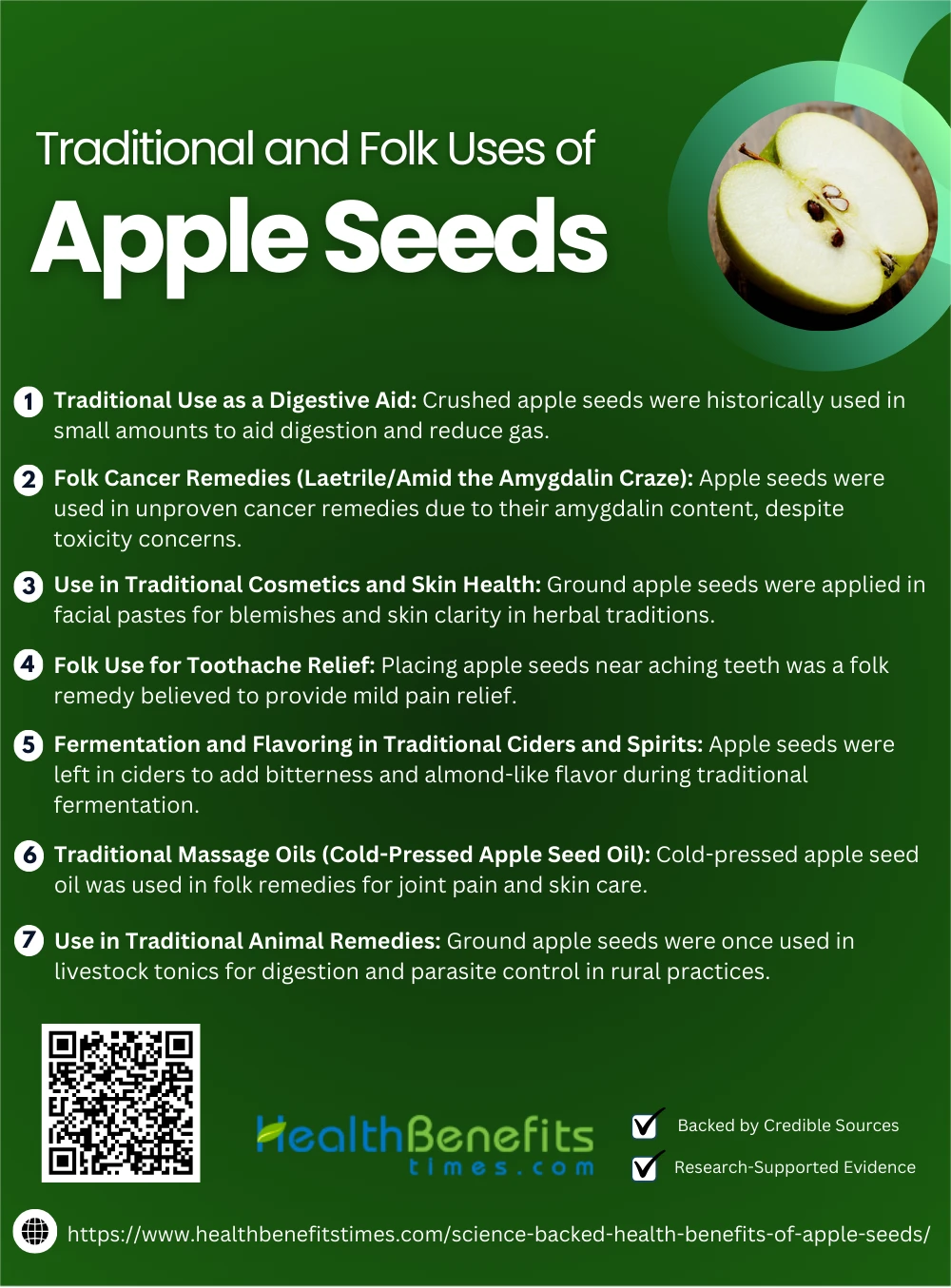 1. Traditional Use as a Digestive Aid
1. Traditional Use as a Digestive Aid
In some European and Middle Eastern folk traditions, small amounts of crushed apple seeds were historically consumed after meals to aid digestion and reduce gas. Healers believed that the bitter compounds in the seeds could stimulate the digestive tract and bile production. However, this practice was often accompanied by strict dosing, usually involving a few seeds only, and was discouraged for daily use due to the seeds’ toxicity.
2. Folk Cancer Remedies (Laetrile/Amid the Amygdalin Craze)
Apple seeds were once included in various folk cancer remedies, especially in the 20th-century “laetrile” movement, which gained popularity in parts of the U.S., Mexico, and Eastern Europe. This stemmed from their amygdalin content, thought to be selectively toxic to cancer cells. While some alternative practitioners touted this approach as a “natural chemotherapy,” scientific evidence never validated these claims, and laetrile was eventually banned or regulated in many countries due to the risk of cyanide poisoning.
3. Use in Traditional Cosmetics and Skin Health
In Persian and South Asian herbal practices, apple seeds were sometimes ground and mixed into facial pastes for treating blemishes, promoting skin clarity, or reducing age spots. The belief was that the natural oils and polyphenols in the seeds helped restore skin balance. However, these seeds were not applied in high concentrations due to the potential for skin irritation or toxicity.
4. Folk Use for Toothache Relief
Some rural European traditions involved placing a whole apple seed under the tongue or near an aching tooth, with the idea that its bitter compounds could numb pain slightly or draw out “bad humors.” This is likely connected to the mild analgesic properties of certain amygdalin-derived compounds, although this use remains anecdotal and not scientifically supported.
5. Fermentation and Flavoring in Traditional Ciders and Spirits
In cider-making traditions, particularly in France and the UK, apple seeds were occasionally left in during fermentation to lend a slight bitterness or almond-like flavor to cider or brandy. This was done carefully, as overexposure could ruin the taste or release undesirable compounds. Distillers and winemakers sometimes embraced the unique aromatic compounds released from the seeds, similar to how certain grape seeds influence wine tannins.
6. Traditional Massage Oils (Cold-Pressed Apple Seed Oil)
In Central Asia and parts of Eastern Europe, cold-pressed apple seed oil—obtained after drying and crushing the seeds—was used as a folk remedy for joint pain, skin softening, and even scalp massage. Its vitamin E and fatty acid profile made it appealing for local apothecaries, though the seeds were always processed carefully to neutralize toxins before topical use.
7. Use in Traditional Animal Remedies
In some rural practices, apple seeds were ground and mixed with other herbs and grains to prepare traditional animal tonics, especially for livestock digestion and parasites. Farmers believed that in trace amounts, bitter compounds from seeds helped “cleanse” the animal’s gut. However, these practices are no longer recommended due to the cyanogenic risk to animals.
Potential side effects of Apple Seeds
Apple seeds contain amygdalin, which can release cyanide when digested. In large quantities, this may lead to poisoning symptoms such as nausea, dizziness, or more severe toxic effects.
Apple seeds contain amygdalin, which converts into hydrogen cyanide in the digestive system, posing a poisoning risk if consumed in large amounts. Research confirms that this compound is toxic when metabolized. (32) Juicing whole apples may inadvertently expose one to cyanide (Quora). Accidental overconsumption can result in lethal consequences. (33)
2. Dizziness
Ingesting chewed apple seeds can cause dizziness, a common early symptom of cyanide exposure. Even a modest quantity may lead to discomfort if chewed and digested (JustAnswer Medical). This is due to amygdalin, a cyanogenic glycoside found in seeds. Overconsumption of fruit seeds can elevate toxicity risks. (34) (32)
3. Nausea
Consuming chewed apple seeds can result in nausea, as they release cyanide through the compound amygdalin. The digestive breakdown of this toxin is known to cause nausea and vomiting in even moderate doses. Regulatory agencies warn that cyanide exposure may irritate the stomach lining, particularly in children. (35)
4. Headaches
The ingestion of apple seeds may lead to headaches due to the cyanide generated from amygdalin metabolism. Cyanide disrupts cellular respiration, which can manifest as neurological symptoms such as headaches. Studies show high amygdalin content in certain apple varieties, and even a few chewed seeds may trigger symptoms. (33) (36)
5. Difficulty Breathing
Cyanide released from chewed apple seeds can impair cellular respiration, leading to difficulty breathing. The toxin disrupts oxygen utilization in the lungs and tissues (Johns Hopkins). The lungs are particularly vulnerable to systemic cyanide exposure. (37) This is due to amygdalin, which breaks down into hydrogen cyanide. (32)
6. Seizures
Consuming a high number of apple seeds may trigger seizures, especially if the seeds are chewed and amygdalin is metabolized into cyanide. Cyanide inhibits ATP production in neurons, leading to severe neurological disturbances. (35) The biochemical reaction begins when prussic acid is released, and concentrated exposure is especially risky during juicing. (32) (38)
7. Loss of Consciousness
When chewed, apple seeds release cyanide, a potent neurotoxin that impairs mitochondrial respiration. This disruption can deprive the brain of energy, leading to loss of consciousness. (39) Cyanide’s inhibition of oxygen use causes rapid neural damage (Johns Hopkins), primarily from the breakdown of amygdalin. (32)
8. Death
Apple seeds metabolize into hydrogen cyanide, a lethal toxin. Just 1–2 mg/kg of body weight can be fatal in humans, making large doses of chewed seeds deadly. (40) Even small exposures can escalate rapidly, leading to coma or death. The danger arises from the seed’s amygdalin content. (38) (35)
Conclusion
In conclusion, while often overlooked, apple seeds possess a range of science-backed health benefits due to their rich content of antioxidants, essential fatty acids, and phytonutrients. Research suggests they may support heart health, combat oxidative stress, and offer anti-inflammatory properties when consumed in safe, minimal amounts. However, caution is necessary, as excessive intake can pose toxic risks due to cyanogenic compounds. Moderation and proper preparation are key to harnessing their potential safely. As science continues to explore natural plant compounds, apple seeds serve as a reminder that even the smallest parts of fruits can contribute to overall wellness when used wisely.


